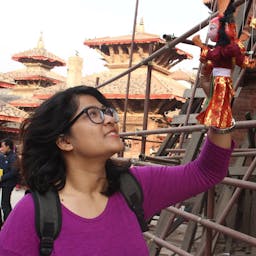Do Women Have The Right to Feel Secure?
Jun 4, 2019
Story
His arms fling over my shoulder and I feel his finger tips trying to reach the side of my left breast. I feel his every movement in the crowded public vehicle in Kathmandu. I feel uncomfortable with the middle-aged man sitting beside me in the dark vehicle. I was scared but confused if he was trying to place his hand on the window beside me because we were cramped in the one-seater seat beside the driver or he was trying to touch me. I was also wearing a dress which was not revealing but it did not allow me to stand in the rear of the crowded vehicle with my friends. In those few seconds when his hand traveled from my shoulder to my side, I questioned myself, ‘Why I am sitting here? Why did I wear this dress? Am I being harassed?'
When his hands got closer and brushed my breast, I knew his intentions. I did not shout or scream but told him to move his hand, loudly enough for the driver beside him to hear. The driver looked at us. 20 seconds later, the middle-aged man asked to be dropped in a place which wasn’t even a stop.
This incident scarred me for a long time. I feared wearing a dress, sitting in the specific seat if I traveled, I feared travelling at night or sitting beside any man in a public transport. This incident happened around two years back and it took a long time for me to understand IT WASN’T MY FAULT.
I grew up in a society where girls aren’t supposed to go out at night and wear revealing cloths to gather attention. Therefore, I was scared to talk about this to anyone other than my friends because I knew the reply would be, ‘See! I told you so'.
Nepal is a patriarchal society where women are the second sex in most social hierarchies. The domination towards women is decorated with words such as ‘safety’ and ‘security’ to shut us behind the four walls of the house. The men who take decision for us don’t understand we don’t need to be kept safe if the environment outside the four walls is safe. The solution is to solve the problem, not hide from the problem.
I have been eve teased, flashed, physically and verbally harassed in the streets and public vehicle. But my experiences are nothing compared to what many women in Nepal go through.
According to the Nepal Peace Monitoring Project, in 2017, 680 incidents of gender-based violence was documented though the actual number may be higher. 430 women were reported to be raped or attempted to be raped, 116 women faced domestic violence, 13 women faced accusation of being a witch, 44 murders of women and 53 assaults were related to gender-based violence.
In Nepal, women are the prestige and honor of the family. It is not easy for them to voice out their plea for justice because most of the time, the issue is suppressed so that no one knows about it. That is the reason many cases don’t get reported. The number of cases reported on gender-based violence have increased distinctly but the question on safety rises as the perpetrators are not caught in certain cases for more than two months now like the rape case of a 13-year-old girl, Nirmala Pant. There were demonstrations and cry for justice from different parts of the country, yet Pant is yet to get justice.
On September 24, 2018, an 18-year-old girl died of multiple organ failure 10 days later of an acid attack by her neighbor. It brings forth an important question, if home and neighborhood is not secure then where can security be guaranteed?
The society would feel safer to live in if the core problem was sought and rooted out instead of making women compromise her freedom. Women know how to take precautions and I know this because I while walking at night, I always have something in my hand to defend if someone attacks me, I have my emergency contact memorized, battery full charged in my mobile while travelling alone, no earphones on when I’m in an unfamiliar area and I don’t even live in a very dangerous city of my country.
But girls shouldn’t have to think about being attacked or snatched every time she goes out because according to Article 3 of Universal Declaration of Human Rights (UDHR), ‘Everyone has the right to life, liberty and security of person.’ But sometimes we forget the second sex is also a human.




